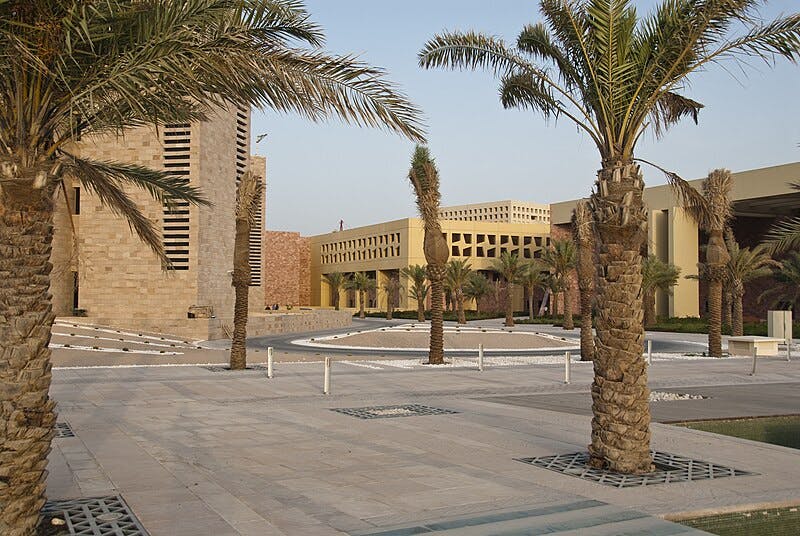Qatar Fumes After Texas A&M Announces Shutdown of Controversial Doha Satellite Branch ‘Due to Instability’
The university has received nearly $500 million in contracts from the Qatar Foundation in the past two decades, presumably making this a difficult break.

On Thursday, Texas Agricultural and Mechanical University announced its intention to shutter its satellite campus at Qatar’s Education City.
According to a press release issued by the university, “The Board of Regents decided to reassess the university’s physical presence in Qatar in fall 2023 due to the heightened instability in the Middle East.”
It adds: “In the afternoon’s public session, Regent Mike Hernandez made a motion to terminate the agreement with the Qatar Foundation. The motion was seconded by Regent Randy Brooks and passed on a 7-1 vote.”
The board “has decided that the core mission of Texas A&M should be advanced primarily within Texas and the United States,” it said.
Terminating the agreement in 2028 will mark the end of a controversial, yet very lucrative, chapter in the storied history of the Aggies. The school has received nearly $500 million in contracts from the Qatar Foundation in the past two decades, according to public records examined by Judicial Watch. “All costs associated with operating a campus in the Middle East are paid by the Qatar Foundation,” a Texas A&M spokeswoman explained to a local news outlet, KBTX 3, shortly after October 7.
The Qataris did not hide their unhappiness with the state school’s decision to terminate the relationship. In a statement posted on X, formerly Twitter, the Qatar Foundation said, “It is disturbing that this disinformation has become the determining factor in the decision.” The foundation blamed a “disinformation campaign aimed at harming the interests of QF.”
It added that the decision will “override the core principles of education and knowledge, with no consideration to the significant positive impact that this partnership has brought for both Qatar and the US.”
In January, the Jerusalem Post reported that researchers from the Institute for the Study of Global Antisemitism and Policy had come across “unreported and unregulated funding to Texas A&M University,” and pointed out “Qatar’s substantial ownership of nuclear research and sensitive weapon development rights at the university, warning of a serious potential threat to US national security.” The report was dismissed by the school’s president, Mark Welsh, as “insanity” and not accurate.
In response to the Qataris’ statement, a Texas A&M spokeswoman told the Sun, “The Qatar Foundation is jumping to an unfortunate and incorrect conclusion.”
She added that the decision was made “following close analysis of the university’s mission and the evolving political situation in the Middle East.”
As part of its bankrolling a no-expenses-spared education complex of Western university satellite branches, including that of Texas A&M, the Qatar Foundation is known to advance the emirate’s Islamist worldview. As the executive director of the Association for the Study of the Middle East and Africa, Asaf Romirowsky, explained to the Sun, the Qatar Foundation’s “bottom line is spreading Islamist ideology through American institutions. This is how they are trying to whitewash their ideology by rolling it through institutions.”
In the immediate aftermath of October 7, the foundation’s president stated on X that she stands “fully with Palestine,” and the foundation encouraged followers to pray for its “liberation” after the terror attacks by means of prayer, or “‘dua,’ for our Palestinian brothers and sisters, that they may be liberated from their oppressors.”
The Qatar Foundation has not shied away from influencing Texas A&M’s Qatari branch in a manner that would be alien to its American home campus. In August, the head of Texas A&M Qatar’s history department, Joseph Ura, resigned. The cause, according to a lawsuit filed, was that a senior Qatar Foundation official had tried to force him to now renew the contract of a history professor, Brittany Bounds. The Qatar Foundation wanted Ms. Bounds out due to her Air Force service and her support of Israel, according to Mr. Ura’s lawsuit.
Ms. Bounds, who is still employed by Texas A&M in Qatar, did not wish to speak to the Sun on the record. However, in a statement provided to the Sun, Mr. Ura explained that he observed Texas A&M Qatar’s dean of faculty, Cesar Malave, “discriminating against Dr. Bounds due to her veteran status and sex.” He also said he witnessed “a larger pattern of sex discrimination by Dean Malave and reported another specific case of discrimination by Dean Malave and a separate case of failure to properly report an allegation of sex discrimination against Dean Malave and another member of the dean’s staff.”
Texas A&M did not respond to a Sun query about the lawsuit.
The Qatar royal family has long been involved in the American education system. The Qatar Foundation’s CEO is Sheikha Hind bint Hamas Aal Thani, the sister of the Qatari emir. Her brother, Prince Hamad bin Khalifa Al Thani, was reported to have cheated his way through the University of Southern California, using family money to hire a USC graduate student to complete his assignments, an L.A. Times investigation in 2020 detailed.

